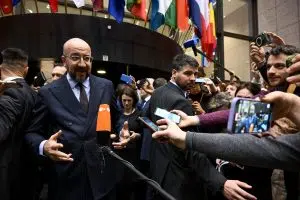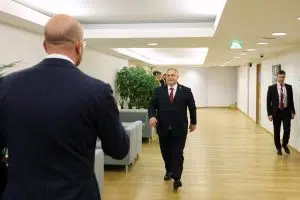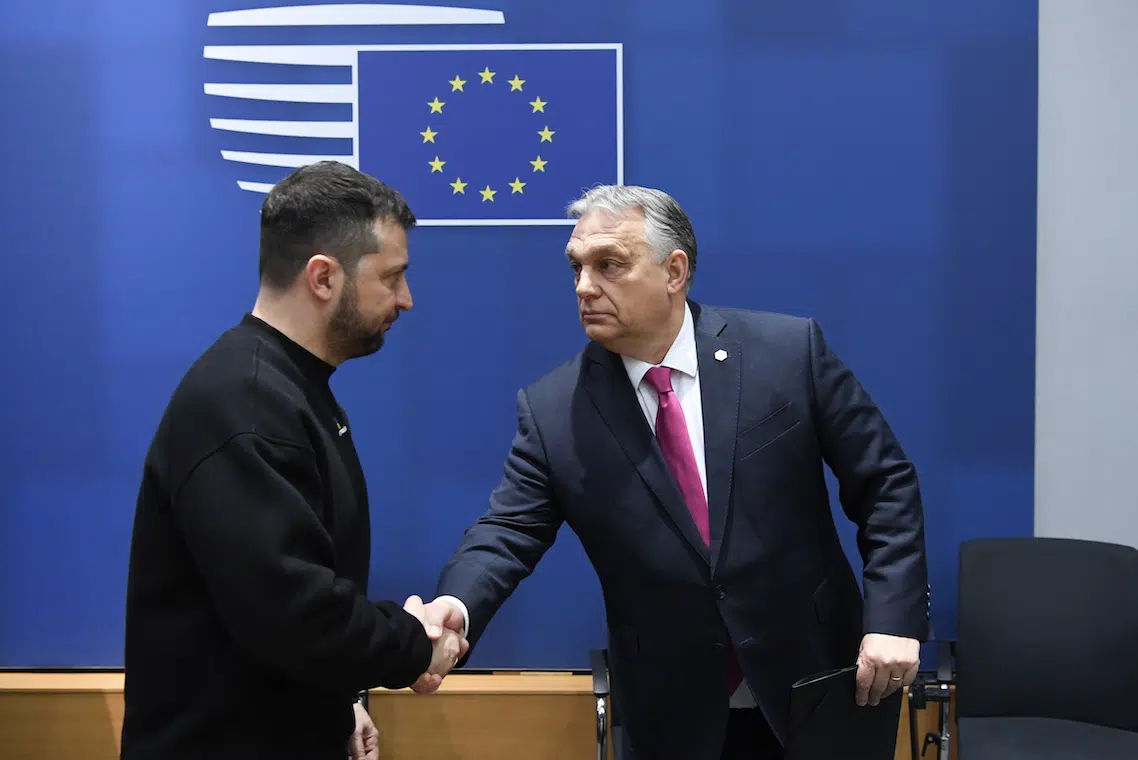Brussels – The most awaited news for Ukraine came even sooner than hoped. The European Council gave the green light today (Dec. 14) to start EU accession negotiations with a formula that stunned even insiders. To get through the stalemate brought about by his own obstructionism, Viktor Orbán, the Hungarian prime minister, left the room at the time of the vote, and so the other 26 EU leaders were able to endorse the most awaited of the summit’s conclusions. Along with the path of Ukraine, the path of Moldova (start of negotiations), Bosnia and Herzegovina (negotiations with reservations), and Georgia, which was granted candidate status for EU membership.
“We want to support Ukraine; this is a very strong signal and decision,” said European Council President Charles Michel, who came down to the press room to speak to reporters after the news of the unblocking of the negotiations, “Today, I think of the Ukrainian people to whom we are close. This is an extremely important decision for the credibility of the Union.” It was precisely the European Council’s chief who had announced a few minutes earlier on X that leaders had decided to “open accession negotiations with Ukraine and Moldova,” to “grant candidate status to Georgia,” and to “open negotiations with Bosnia and Herzegovina once the necessary degree of compliance with the accession criteria has been reached” and inviting the EU Commission to report “by March with a view to taking such a decision.” The EU Commission’s decision was also a good one. Relaunching the same post, Ukraine’s president, Volodymyr Zelensky, exulted over the Council’s decision: “Ukraine’s victory, the victory of all Europe, a victory that motivates, inspires and strengthens. I thank all those who worked to make this happen and all those who contributed.” Zelensky – who this morning had addressed the 27 EU leaders via video conference, asking them to “not betray the Ukrainians” – also congratulated the Moldovan president, Maia Sandu, and stressed that “history is made by those who do not tire of fighting for freedom.”

“A strategic decision and a day that will remain etched in the history of our Union, I am proud that we have kept our promises and happy for our partners,” said European Commission President Ursula von der Leyen, who saw the approval of all the recommendations in her Enlargement Package 2023. The president of the EU Parliament, Roberta Metsola, also defined the day as “a proud moment for Europe, for Ukraine, for Moldova, for all those who fight for our values and for all those who look to Europe as a beacon of hope,” in which “we kept our promises, we made history, now we will write the future together.” Also satisfied was Italy’s prime minister, Giorgia Meloni, for the “concrete steps forward” in the enlargement process for Ukraine, Moldova, Georgia, and Bosnia and Herzegovina, described in a note from Palazzo Chigi as a “result of significant value for the European Union and Italy, which came as a result of complex negotiations.”
The Orbán-Ukraine Case
Speaking to reporters, President Michel also stressed that “it was important that no member state objected.” This comment raised quite a few concerns not only for the speed of the decision (in just over three hours) concerning an issue that it was feared could keep the decision-making process stuck throughout the day and beyond but especially for Orbán’s change of attitude. Qualified sources later disclosed that the Hungarian premier was not present in the room at the time of the vote and did not delegate anyone in his place, de facto abstaining. “In the case of a unanimous vote, an abstention does not prevent the adoption of a decision,” this is what they predict the Treaties.

European Council President Charles Michel welcomes Hungary’s prime minister, Viktor Orbán (Dec. 14, 2023)
While it is true that with his pseudo-abstention (he did not de facto abstain but did not show up at the time of the vote at all) Orbán ensured that the line overwhelmingly shared by the leaders of the Union could pass, one cannot hide the fact that the Hungarian premier himself has already begun his propaganda rhetoric of opposition in Brussels: “Starting accession negotiations with Ukraine is a bad decision, Hungary did not participate in the decision.” On the one hand, this is a clear defeat for the strongman in Budapest – who can count on the lack of public opinion at home that will hold him accountable at a time when he should have made the national position count – but there is also more to consider. Today was only the first rehearsal for unanimity in the Council, Orbán proved that he can exploit this weapon to have frozen EU funds unblocked and is unlikely to choose not to repeat the same obstructionism on the issue of enlargement when it is necessary for his interests. The European Council – the body that sets the Union’s priorities and general policy directions – is tasked with making a political decision on the start of a third country’s accession process and the most decisive moment (the start of negotiations). But the task of formally grounding the decision lies with the Council of the European Union – the decision-making body that represents the governments of the 27 member countries and holds legislative power together with the European Parliament – which, according to the Treaties, has the final word on the matter: “Accession negotiations cannot begin until all EU governments agree, in the form of a unanimous decision of the Council of the EU, on a framework or mandate for negotiations with the candidate country.” Orbán’s Hungary will still have the veto card to play many times over, and the recent experience of Albania and North Macedonia should be a warning to Ukraine and the other 26 Member States. After the European Council decided to start accession negotiations with Tirana and Skopje on March 25, 2020, it took more than two years before they could effectively begin (on July 19 last year).
 The EU enlargement process begins with a non-EU state submitting a formal application for membership with the rotating presidency of the Council of the European Union. Union membership first requires passing the Copenhagen criteria (established at the European Council in the Danish capital in 1993 and strengthened by the EU leaders’ meeting in Madrid two years later). These criteria are divided into three groups of basic demands that the Union addresses to the country that has applied for membership: rule of law and democratic institutions (including respect for human rights and protection of minorities), stable market economy (ability to cope with market forces and competitive pressure), and fulfillment of its obligations (effectively implement the body of EU law and meet the objectives of political, economic and monetary Union). After obtaining a favorable opinion from the Commission, a country is granted candidate status with the approval of all members of the Union. After this, the Commission recommends to the EU Council to open negotiations, which, again, requires the unanimous go-ahead of the member countries: this allows to begin the negotiating chapters (varying in number), the purpose of which is to prepare the candidate, particularly on the implementation of the necessary judicial, administrative and economic reforms. Upon completion of the negotiations, and EU enlargement is possible in terms of absorption capacity, the parties sign the Accession Treaty (with the terms and conditions for accession, including any safeguard clauses and transitional provisions), which must first be approved unanimously by the European Parliament and by the Council.
The EU enlargement process begins with a non-EU state submitting a formal application for membership with the rotating presidency of the Council of the European Union. Union membership first requires passing the Copenhagen criteria (established at the European Council in the Danish capital in 1993 and strengthened by the EU leaders’ meeting in Madrid two years later). These criteria are divided into three groups of basic demands that the Union addresses to the country that has applied for membership: rule of law and democratic institutions (including respect for human rights and protection of minorities), stable market economy (ability to cope with market forces and competitive pressure), and fulfillment of its obligations (effectively implement the body of EU law and meet the objectives of political, economic and monetary Union). After obtaining a favorable opinion from the Commission, a country is granted candidate status with the approval of all members of the Union. After this, the Commission recommends to the EU Council to open negotiations, which, again, requires the unanimous go-ahead of the member countries: this allows to begin the negotiating chapters (varying in number), the purpose of which is to prepare the candidate, particularly on the implementation of the necessary judicial, administrative and economic reforms. Upon completion of the negotiations, and EU enlargement is possible in terms of absorption capacity, the parties sign the Accession Treaty (with the terms and conditions for accession, including any safeguard clauses and transitional provisions), which must first be approved unanimously by the European Parliament and by the Council.
English version by the Translation Service of Withub

![Il presidente dell'Ucraina, Volodymyr Zelensky, in collegamento con i leader dell'UE [Bruxelles, 14 dicembre 2023. Foto: European Council]](https://www.eunews.it/wp-content/uploads/2023/12/zelensky-231214-350x250.jpeg.webp)






